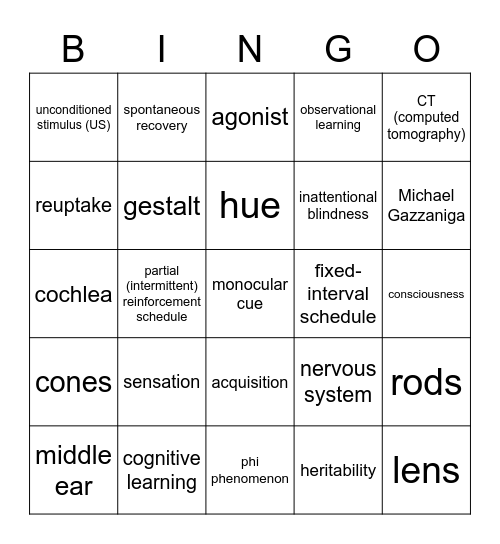

This bingo card has 164 words: neuron, dendrites, axon, myelin sheath, action potential, refractory period, threshold, all-or-none response, synapse, neurotransmitters, reuptake, endorphins, agonist, antagonist, nervous system, central nervous system (CNS), peripheral nervous system (PNS), nerves, sensory (afferent) neurons, motor (efferent) neurons, interneurons, somatic nervous system, autonomic nervous system (ANS), sympathetic nervous system, parasympathetic nervous system, reflex, endocrine system, hormones, adrenal glands, pituitary gland, lesion, electroencephalogram (EEG), CT (computed tomography), PET (positron emission tomography), MRI (magnetic resonance imaging), fMRI (functional MRI), brainstem, medulla, thalamus, reticular formation, cerebellum, limbic system, amygdala, hypothalamus, cerebral cortex, glial cells (glia), frontal lobes, parietal lobes, occipital lobes, temporal lobes, motor cortex, somatosensory cortex, association areas, plasticity, neurogenesis, corpus callosum, split brain, consciousness, dual processing, behavior genetics, heritability, Paul Broca, Michael Gazzaniga, Roger Sperry, Carl Wernicke, sensation, sensory receptors, perception, bottom-up processing, top-down processing, selective attention, inattentional blindness, change blindness, transduction, signal detection theory, difference threshold, priming, Weber's law, sensory adaptation, perceptual set, wavelength, hue, intensity, cornea, pupil, iris, lens, retina, rods, cones, optic nerve, blind spot, fovea, Young-Helmholtz trichromatic (three-color) theory, opponent-process theory, feature detectors, gestalt, figure-ground, depth perception, binocular cue, retinal disparity, monocular cue, perceptual constancy, color constancy, audition, frequency, pitch, middle ear, cochlea, inner ear, sensorineural hearing loss, conduction hearing loss, place theory, frequency theory, gate-control theory, olfaction, kinesthesia, vestibular sense, subliminal, parrallel processing, phi phenomenon, motion parallax, habituation, cognitive learning, classical conditioning, neutral stimulus (NS), unconditioned response (UR), unconditioned stimulus (US), conditioned response (CR), conditioned stimulus (CS), acquisition, higher-order conditioning, extinction, spontaneous recovery, generalization, discrimination, operant conditioning, law of effect, reinforcement, shaping, positive reinforcement, negative reinforcement, primary reinforcer, secondary (conditioned) reinforcer, continuous reinforcement schedule, partial (intermittent) reinforcement schedule, fixed-ratio schedule, variable-ratio schedule, fixed-interval schedule, variable-interval schedule, punishment, cognitive map, latent learning, insight, learned helplessness, observational learning, modeling, mirror neurons, Albert Bandura, Ivan Pavlov, B.F. Skinner, Edward Thorndike, Edward Tolman and John B. Watson.
PSYC 1010 | PSYC 1010 | Psychology Final Exam | Learning | Psychology VCE
Share this URL with your players:
For more control of your online game, create a clone of this card first.
Learn how to conduct a bingo game.
With players vying for a you'll have to call about __ items before someone wins. There's a __% chance that a lucky player would win after calling __ items.
Tip: If you want your game to last longer (on average), add more unique words/images to it.